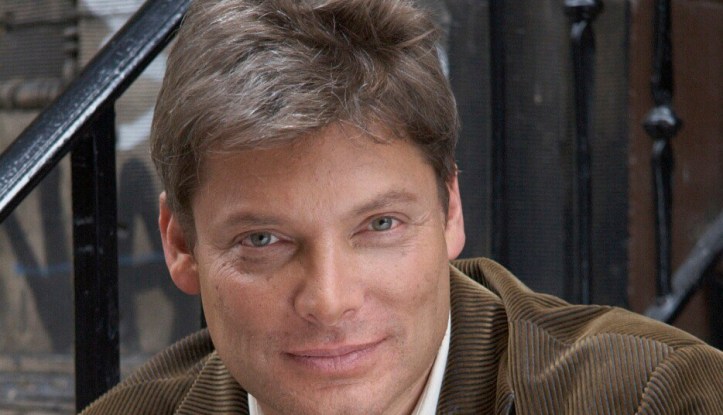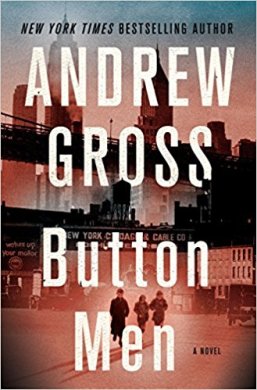
A few years ago, well-known thriller author Andrew Gross made headlines when it was announced that he’d be switching genres after signing a book deal with Minotaur Books, an imprint of St. Martin’s Press. Months later, in the summer of 2016, Gross debuted his first historical fiction novel, The One Man, receiving high praise from critics and readers.
Personally, The One Man is one of the best books I’ve ever read. The story follows a young man named Nathan Blum who escaped the Krakow ghetto as a teenager, after the Nazis executed his family, and later joined the OSS. Still new to America, Wild Bill Donovan tasks Blum with infiltrating Auschwitz in order to rescue one of only two men on the planet who possess the knowledge needed in order to complete the A-Bomb.
For that book, Gross takes readers into the living hell of Auschwitz, delivering a gripping story that’ll have you crying, laughing, and cheering before leaving you absolutely stunned. Never before has a story stayed with me for as long as that one, and Andrew Gross has been one of my favorite writers ever since. So, when I got the opportunity to have him on for a Five Questions segment, I couldn’t wait to discuss The One Man and his fantastic new book, Button Man.
See the full Q&A below, then keep scrolling to read more about Button Man, in stores everywhere tomorrow, September 18, 2018.
TRBS: Ever since switching genres a few years back, you’ve been on absolute fire. The One Man is one of the best books I’ve ever read, and it was a huge hit with Book Spy followers. Your new book, Button Man, is right up there as well. What prompted your switch from the thriller/mystery books you used to write to historical fiction?
Gross: “Thanks on The One Man. As you know, I had some success over the years writing what I call ‘suburban thrillers,’ meaning, upscale people in similar settings who get the family in peril through either random fate or a mistake of their own. But I began to want to write different books – books of greater heft and larger themes. Where the outcomes of the plot really mattered. In much more nuanced and atmospheric settings that I traditionally worked in. Books that transported you – not just entertained you. So after being typecast after all those books, I took the step and decided to rebrand. An idea stared me in the face – my father in law’s tragic history in WWII, and while, like a lot of survivors, he was silent about his own experiences, I decided to write the story he might tell if he ever opened his memory. That became The One Man. From that point on, I knew I had found my new genre.”
TRBS: How did you come up with the story idea for The Button Man, and how much research did you have to do before actually sitting down to write it?
Gross: “Button Man is fiction, but it is drawn from a well of personal history. It’s about a young immigrant who rises from the streets of the Lower East Side, drops out of school at twelve to work in a garment factory, ends up running that factory by the time he was twenty, battles the Jewish mob who have taken over the garment unions and shows off the knife scar in his abdomen to prove it, and ends up founding an iconic women’s clothing company that bears his daughter’s name.
“That man was my grandfather.
“It’s a rag to riches story, what I call Great Expectations merged with The Godfather. The Jewish mob is something not many people know much about, but in the 1920s and early 1930s, it was tougher and bloodier than the Italian mob. In fact, the Italians used to farm out their hits to the Jews, hence the name, Murder, Incorporated. Mobsters like Louis Lepke and Dutch Schultz are very much a part of the book. And back then, to succeed in the garment business you had to be tough – tougher than the mobsters who tried to control your business. My grandfather was such a man. Half the Jews in America came from the Lower East Side and the other half, it seems, worked in the garment biz, so while I thought I am writing my own story, it turns out I was writing everyone’s.”
TRBS: I would imagine writing historical fiction requires a lot more research than traditional thrillers. Is that true, and what has been the most challenging (or most surprising) thing about switching genres?
Gross: “So, as I mentioned, I was steeped in garment center lore and history from the time I could first speak. I also worked in the industry for twenty years before I took up writing. Probably the most rewarding and emotional part of the research was going to F.I.T. in NYC and meeting with the head archivist there. After pouring through microfilmed copies of Women’s Wear Daily from the ‘20s and a few old books on the old-time business, she told me, ‘Many of the founding fathers of the industry have recorded their personal histories on tape for the archives here. Your grandfather made one. Would you like to hear it?’ And that was how thirty years after his death I was able to hear his voice again, telling the old tales, like he hadn’t died but only gone away for a while. And now he was back. I listened to it through a lot of tears. But it’s one of the ways the book is such a realistic evocation of those times.
“And yes, research is one of the challenges, of course. To get the times and the situations right. But coming up with an idea is a lot tougher than what I did before, since not only do you have to construct a plot and characters, but the outcome of that plot has to have moral and historical significance in turns of how the world works out – that without it, without the outcome, or the actions of the hero, the world might have resolved differently. So it’s a double threshold that has to be met, making it far more challenging than just coming up with a new crime and backstory for familiar characters in a consistent setting.”
TRBS: What is your writing process like, and what advice would you give to new or aspiring authors?
Gross: “Well, I outline heavily before beginning. It is also the part of the process that allows me to do my research on a period. I learned this from working with James Patterson. My outlines are likely longer and more detailed than most – it’s also how I do my plotting. While the process of writing the book always brings up changes – things happen in different sequences, a character might die, I’ve even changed the ending, 70-80% — the story always seems to proceed as from my outline. I spend about a month on it. So once I have it, the writing of the book flows easier. I try to write a chapter a day – it’s a marathon to me, not a sprint – always beginning by looping back on yesterday’s work, which, of course, never reads as smoothly as I thought the day before. Then I go forward. I can do this many times until I feel comfortable that the scene is successful and fits smoothly in the book. My chapters have gotten longer, so I write about 4-8 pages a day – 1,000 to 2,000 words. But they always need a lot of attention the next day.
“As such, my advice for anyone taking up this work – besides laying your plot out in advance in an outline – is patience. Writing is a process of continuous improvement. It doesn’t happen naturally for most, nor does it happen on our timetable. I think new writers, buoyed by praise from their family or writing groups, are too eager to get their work in the hands of agents. Time is the best editor. A book needs distance and constant editing, as many of the sexy ideas, clues, and plot reversals that seems so seamless in the book actually come on the third or fourth round of edits. So patience is my mantra, and studying how writers you admire do it themselves. Anything can be learned or improved upon. Just don’t rush it.”
TRBS: Lastly, what’s next for you?
Gross: “What’s next? I’m staying in NYC, but this time in the year prior to WWII, in Yorkville on the Upper East Side, which was a historically German neighborhood – all butchers and beer halls – where in the run-up to WWII, pro-Nazi rallies and parades were held openly. In fact, in 1938, 2,000 pro-Nazis wearing swastikas filled Madison Square Garden for a giant rally. (That time was highly divided between isolationists like Charles Lindbergh urging us to stay out of a European war and interventionists, like FDR, pushing us to get involved and help Britain.) So my new book is about a young couple in a Yorkville brownstone who begin to suspect that the kindly Swiss neighbors across the hall might be Nazi spies. And it escalates from there. Nazis do come out of the woodwork. It’s a bit of early Hitchcock meets Rosemary’s Baby.
“Thanks for the good questions and support on the book.”
 Following up The One Man and The Saboteur, Gross’s next historical thriller brings to life the drama of the birth of organized crime in 1930s New York City from the tale of one family.
Following up The One Man and The Saboteur, Gross’s next historical thriller brings to life the drama of the birth of organized crime in 1930s New York City from the tale of one family.
After a string of New York Times bestselling suburban thrillers, Andrew Gross has reinvented himself as a writer of historical thrillers. In his latest novel, Button Man, he delivers a stirring story of a Jewish family brought together in the dawn of the women’s garment business and torn apart by the birth of organized crime in New York City in the 1930s.
Morris, Sol, and Harry Rabishevsky grew up poor and rough in a tiny flat on the Lower East Side, until the death of their father thrust them into having to fend for themselves and support their large family. Morris, the youngest, dropped out of school at twelve years old and apprenticed himself to a garment cutter in a clothing factory; Sol headed to accounting school; but Harry, scarred by a family tragedy, fell in with a gang of thugs as a teenager. Morris steadily climbs through the ranks at the factory until at twenty-one he finally goes out on his own, convincing Sol to come work with him. But Harry can’t be lured away from the glamour, the power, and the money that come from his association with Louis Buchalter, whom Morris has battled with since his youth and who has risen to become the most ruthless mobster in New York. And when Buchalter sets his sights on the unions that staff the garment makers’ factories, a fatal showdown is inevitable, pitting brother against brother.
This new novel is equal parts historical thriller, rich with the detail of a vibrant New York City in the 1920s and 1930s, and family saga, based on Andrew Gross’s own family story and on the history of the era, complete with appearances by real-life characters like mobsters Louis Lepke and Dutch Schultz and special prosecutor Thomas Dewey, and cements Gross’s reputation as today’s most atmospheric and original historical thriller writer.
Praised as “one of today’s finest book reviewers” by New York Times bestselling author Gayle Lynds, Ryan Steck (“The Godfather of the thriller genre” — Ben Coes) has “quickly established himself as the authority on mysteries and thrillers” (Author A.J. Tata). He currently lives in Southwest Michigan with his wife and their six children.
